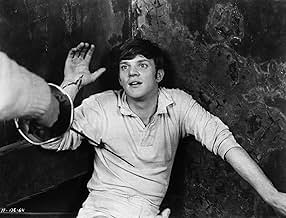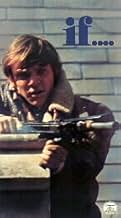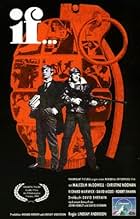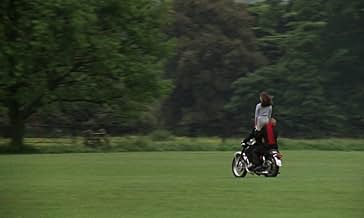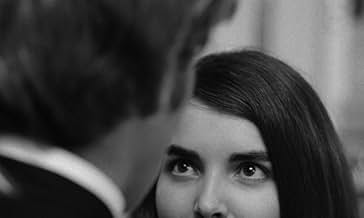In this allegorical story, a revolution led by pupil Mick Travis takes place at an old established private school in England.In this allegorical story, a revolution led by pupil Mick Travis takes place at an old established private school in England.In this allegorical story, a revolution led by pupil Mick Travis takes place at an old established private school in England.
- Nominated for 2 BAFTA Awards
- 2 wins & 4 nominations total
Mary MacLeod
- Mrs. Kemp - Staff
- (as Mary Macleod)
Featured reviews
Made in 1968, this film still made me shiver even though I started at public school in 1977. Things had changed somewhat by then, but not beyond recognition, and for sure I felt powerful echoes in this movie. By the time I left, the country was steeped in Thatcherism, and the style of self advancement that came with it was replacing the old guard watchers of 'If....' would recognise. The housemaster and headboy were 2 characters I can especially recall, but there are flashes of others in many of the characters.
When you see this film, see it as a historical satire, with first the historical atmosphere of a public school being accurately recreated, then second the satire taking form just in time to administer the purgative judgement of the surreal denouement.
There. Spoken like a public schoolboy.
When you see this film, see it as a historical satire, with first the historical atmosphere of a public school being accurately recreated, then second the satire taking form just in time to administer the purgative judgement of the surreal denouement.
There. Spoken like a public schoolboy.
Lindsay Anderson's "If...." begins rather slow, establishing itself as a typical boarding school drama, as students arrive and get into routine at a 500-year-old public school in Britain. In the second half, though, the film takes a turn for the surreal, becoming a dreamlike dark comedy with cultural relevance and artistic wonder.
Watching "If...'s" first few scenes, we expect that the main character will be a first-year student at the school who adapts to the institution's rigorous standards and social hierarchies. However, it slowly becomes apparent that our protagonist is actually an upperclassman named Mick Travis (Malcolm McDowell).
With his two loyal friends Johnny (David Wood) and Wallace (Richard Warwick), Mick refuses to conform to the school's conservative agenda. Late in their academic career, the trio decides to give into their rebellious desires, relishing in rule breaking and defying the school's snootier patrons.
The film is thus a commentary on 1960s British counterculture just as much as it itself is a product of that revolution. Mick, Johnny, and Wallace reflect the time's rebellious youth as the rock-n-roll generation turning against society's archaic norms. Meanwhile, the movie partakes in the same counterculture as a piece of subversive art. The surrealist sequences, experimental editing, sexual undertones, and nudity all go against traditional British cinema to offer something novel, and perhaps even appalling for the formalists.
One of the most blatantly defiant methods that Lindsay Anderson endorses is the use of both black-and-white and color film in the same movie. Timing and lighting restraints initially forced Anderson to use black-and-white when filming in the school's chapel. Allegedly, he liked the effect so much that he decided to shoot additional scenes in the outmoded style. There's no telling why Anderson chose certain scenes for color and others for black-and-white, but the nonconformist blend aids the movie's dreaminess. The audience wonders what is real and what is depraved fantasy.
Malcolm McDowell certainly stands out for his performance as Mick. In fact, McDowell is so convincing as a rebel that this performance led to Stanley Kubrick casting him as the lead in "A Clockwork Orange." McDowell also reprised Mick in two additional Anderson films: 1973's "O Lucky Man!" and 1982's "Britannia Hospital." The character has been hailed as an "everyman," and he certainly has our attention, empathy, and support all throughout "If...."
An unfortunate outcome of that support, however, comes at the film's ending. The finale is climactic and in an odd way satisfying, but has aged horrendously. Without giving too much away, I will say that the denouement involves Mick, his friends, the school, and some guns. In the current age, it is hard to cheer the characters on through such a conclusion, given the real-world relevance of gun violence in schools.
None of this is to say that Anderson is at fault for finishing the movie in this way. In 1968, he could not have imagined the weight this ending might someday carry. Also, the conclusion is not necessarily inappropriate watching it today, but it is definitely darker. We can no longer champion Mick's rebellion in its entirety, but must come to terms with its limits and morality after the screen goes black.
Regardless of the lens we see it through, "If...." is an overlooked movie in British (film) history. While it might retain interest from scholars and critics, the general public - at least in America - has sadly forgotten it. Such is a shame, for it is a brilliant piece of cinema that acutely captures the light and dark sides of a pivotal transition in modern Western civilization.
Watching "If...'s" first few scenes, we expect that the main character will be a first-year student at the school who adapts to the institution's rigorous standards and social hierarchies. However, it slowly becomes apparent that our protagonist is actually an upperclassman named Mick Travis (Malcolm McDowell).
With his two loyal friends Johnny (David Wood) and Wallace (Richard Warwick), Mick refuses to conform to the school's conservative agenda. Late in their academic career, the trio decides to give into their rebellious desires, relishing in rule breaking and defying the school's snootier patrons.
The film is thus a commentary on 1960s British counterculture just as much as it itself is a product of that revolution. Mick, Johnny, and Wallace reflect the time's rebellious youth as the rock-n-roll generation turning against society's archaic norms. Meanwhile, the movie partakes in the same counterculture as a piece of subversive art. The surrealist sequences, experimental editing, sexual undertones, and nudity all go against traditional British cinema to offer something novel, and perhaps even appalling for the formalists.
One of the most blatantly defiant methods that Lindsay Anderson endorses is the use of both black-and-white and color film in the same movie. Timing and lighting restraints initially forced Anderson to use black-and-white when filming in the school's chapel. Allegedly, he liked the effect so much that he decided to shoot additional scenes in the outmoded style. There's no telling why Anderson chose certain scenes for color and others for black-and-white, but the nonconformist blend aids the movie's dreaminess. The audience wonders what is real and what is depraved fantasy.
Malcolm McDowell certainly stands out for his performance as Mick. In fact, McDowell is so convincing as a rebel that this performance led to Stanley Kubrick casting him as the lead in "A Clockwork Orange." McDowell also reprised Mick in two additional Anderson films: 1973's "O Lucky Man!" and 1982's "Britannia Hospital." The character has been hailed as an "everyman," and he certainly has our attention, empathy, and support all throughout "If...."
An unfortunate outcome of that support, however, comes at the film's ending. The finale is climactic and in an odd way satisfying, but has aged horrendously. Without giving too much away, I will say that the denouement involves Mick, his friends, the school, and some guns. In the current age, it is hard to cheer the characters on through such a conclusion, given the real-world relevance of gun violence in schools.
None of this is to say that Anderson is at fault for finishing the movie in this way. In 1968, he could not have imagined the weight this ending might someday carry. Also, the conclusion is not necessarily inappropriate watching it today, but it is definitely darker. We can no longer champion Mick's rebellion in its entirety, but must come to terms with its limits and morality after the screen goes black.
Regardless of the lens we see it through, "If...." is an overlooked movie in British (film) history. While it might retain interest from scholars and critics, the general public - at least in America - has sadly forgotten it. Such is a shame, for it is a brilliant piece of cinema that acutely captures the light and dark sides of a pivotal transition in modern Western civilization.
'If...' is a fascinating and powerful film set in an oppressive and archaic public (that's private to us non-Brits) school. It is one of the most original and innovative of all British movies of the 60s, a decade which began in some ways with 'Peeping Tom' and ended with 'Performance', two much maligned movies which in hindsight are astonishing achievements. 'If..' is equally as striking (and disturbing) as those two criminally underrated movies, but in contrast actually achieved quite a level of popularity on its original release. Even so I don't believe the movie gets the attention it deserves. Hopefully it will be rediscovered by a new generation of movie lovers as it is still very relevant and powerful even now, thirty five years later. Malcolm McDowell (his film debut) stars as the ring-leader of a small group of dissatisfied students who don't fit in with their ultra-conformist contemporaries. His performance is first rate, and in several scenes you can almost see Alex, his droog to be ('A Clockwork Orange'). The movie mixes documentary like realism with fantasy sequences involving "The Girl" (Christine Noonan), and eventually violent rebellion. A movie very much of its time it still is very watchable today and has lost little of its power and ability to surprise. Lindsay Anderson, arguably Britain's most underrated director, continued to expand upon McDowell's Mick Travis character in two subsequent movies, but 'If..' has a very different feel from those "sequels", if they can truly be termed that, and can be watched as a stand alone movie. I was impressed with this movie when I first saw it on black and white TV as a young lad, and I was still impressed when I watched it again the other week. And I will guarantee it will not be my last viewing of this brilliant film! A must see for anyone with any interest whatsoever in 1960s pop culture or film.
Lindsay Anderson's 1968 film If... is a beautiful film with a simple message, yet the director's touch and the performances take it to entirely different level.
If... takes place in all boys boarding school and stars Malcolm McDowell as
"Mick" (McDowell in his first screen role). Mick and his two friends feel
somewhat distant from their peers, school, and society. Their general attitude towards such things as sex, war, and authority could be call revolutionary. With surrealistic touches such as unexplained occurrences and changing between
color and black and white. Lindsay Anderson paints a vivid picture of "teenage alienation" before there was a term for such a thing. McDowell would later reprise his role of "Mick" in two other Anderson pictures O' Lucky Man and Britannia Hospital. A must see for fans of McDowell. Just a great film with a message that sparks positive, pro-active thinking. An important film that makes you remember to question authority instead complying to it rules. Sadly If... is not available on DVD at this time.
If... takes place in all boys boarding school and stars Malcolm McDowell as
"Mick" (McDowell in his first screen role). Mick and his two friends feel
somewhat distant from their peers, school, and society. Their general attitude towards such things as sex, war, and authority could be call revolutionary. With surrealistic touches such as unexplained occurrences and changing between
color and black and white. Lindsay Anderson paints a vivid picture of "teenage alienation" before there was a term for such a thing. McDowell would later reprise his role of "Mick" in two other Anderson pictures O' Lucky Man and Britannia Hospital. A must see for fans of McDowell. Just a great film with a message that sparks positive, pro-active thinking. An important film that makes you remember to question authority instead complying to it rules. Sadly If... is not available on DVD at this time.
The best film ever made about school life; the rituals, the drudgery, the humiliation and ultimately the excitement. Anderson's masterpiece works on a number of levels, not least as one of the cinema's great pieces of surrealism. It's a state of the nation movie, a fantasy, an account of public school life told with an almost documentary-like precision and it's as fresh today as it was when it first appeared, (hard to believe that was almost 40 years ago or that Malcom McDowell was ever this young).
Using Jean Vigo's "Zero De Conduite" as a template, (it's not a remake), Anderson's movie is quintessentially youthful and so accurately does it depict its milieu as to appear almost arrogant. He handles revolution with a grandstanding authority and homosexual, (and heterosexual), schoolboy yearning more romantically than any other film I can think of, (Wallace's display in the gymnasium as blonde, beautiful, tousle-haired Bobby Phillips looks on is blissfully homo-erotic), and he does this with a masterly control of the medium. (His comments about financial restraints dictating the fluctuations between black-and-white and colour photography may well be true but the choices seem inspired, nevertheless and the great Miroslav Ondricek's camera-work is superb).
He was also a great actor's director, often working with many of the same actors both in theatre and in cinema and he extracts marvellous performances from the likes of Arthur Lowe, Peter Jeffrey, Mona Washborne and Geoffrey Chater representing the Establishment as well as pitch-perfect performances from David Wood, Richard Warwick, Rupert Webster, Robert Swann and Hugh Thomas, all new to cinema, as the students.
The film made Malcom McDowell a star and for a few short years, (here, in "O Lucky Man", as Alex in "A Clockwork Orange"), that star burned brightly before he sold out to Hollywood and his career began to flounder in a series of mediocre American movies, reaching a nadir with "Caligula". But his performance as Mick Travis is a marvel and both it and the film that first encapsulated it remain among the finest achievements in British cinema.
Using Jean Vigo's "Zero De Conduite" as a template, (it's not a remake), Anderson's movie is quintessentially youthful and so accurately does it depict its milieu as to appear almost arrogant. He handles revolution with a grandstanding authority and homosexual, (and heterosexual), schoolboy yearning more romantically than any other film I can think of, (Wallace's display in the gymnasium as blonde, beautiful, tousle-haired Bobby Phillips looks on is blissfully homo-erotic), and he does this with a masterly control of the medium. (His comments about financial restraints dictating the fluctuations between black-and-white and colour photography may well be true but the choices seem inspired, nevertheless and the great Miroslav Ondricek's camera-work is superb).
He was also a great actor's director, often working with many of the same actors both in theatre and in cinema and he extracts marvellous performances from the likes of Arthur Lowe, Peter Jeffrey, Mona Washborne and Geoffrey Chater representing the Establishment as well as pitch-perfect performances from David Wood, Richard Warwick, Rupert Webster, Robert Swann and Hugh Thomas, all new to cinema, as the students.
The film made Malcom McDowell a star and for a few short years, (here, in "O Lucky Man", as Alex in "A Clockwork Orange"), that star burned brightly before he sold out to Hollywood and his career began to flounder in a series of mediocre American movies, reaching a nadir with "Caligula". But his performance as Mick Travis is a marvel and both it and the film that first encapsulated it remain among the finest achievements in British cinema.
Did you know
- TriviaA British ambassador called the film "an insult to the nation". The then Lord John Brabourne read an early draft and called it "the most evil and perverted script I've ever read. It must never see the light of day".
- GoofsWhen Mick is standing in front of the Trueform shoe store, the camera and crew members are seen reflected in the windows of a passing bus.
- Quotes
Mick Travis: One man can change the world with a bullet in the right place.
- Crazy creditsThe film's opening prologue states: Wisdom is the principal thing; therefore get wisdom: and with all thy getting get understanding PROVERBS IV:7
- Alternate versionsIn the USA, the film was originally released uncut, with an X rating. However, a more commercial rating was preferred and the film was reissued with an R rating after scenes of male frontal nudity were removed from the shower scenes.
- ConnectionsFeatured in Horizont (1971)
- SoundtracksSanctus
from the "Missa Luba" (Philips Recording)
Sung by Les Troubadours du Roi Baudouin (uncredited)
Conducted by Fr. Guido Haazen O.F.M (uncredited)
- How long is If....?Powered by Alexa
Details
- Runtime
- 1h 51m(111 min)
- Color
- Sound mix
- Aspect ratio
- 1.66 : 1
Contribute to this page
Suggest an edit or add missing content


